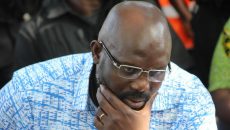When Henry P. Costa, the braggadocios leader of the Council of Patriots, answered the question days ago about whether or not his group will make good its planned Dec. 30 protest calling upon President George Weah to reform his government or resign, the finality of Costa’s tone settled the question about the group’s commitment to confronting President Weah’s administration. This is despite recent mediation efforts by Liberia’s Interreligious Council, in which representatives of ECOWAS and the United Nations were present.
Such open confrontation between the people and the president is nothing new in the history of the Liberian republic. What is new, however, is how mute and dumbfounded the National Legislature has become in the face of these titanic political developments.
If there is any lesson to be drawn from history regarding such confrontations with the chief executive, it can be found in the unfortunate episode of President Edwin James Roye when, according to then Acting President James S. Smith, “the president was deposed on 26th October 1871 by the sovereign people of the republic.â€
For more than a year between May 1870 and October 1871, President Roye, the first True Whig Party president, was engaged in a standoff, first with the people over allegations that he embezzled proceeds from a £100,000 (US$500,000) government loan procured from a British interest in London; and second, with the Legislature as a result of disagreements regarding whether or not the president’s tenure was extended from two to four years in a referendum of May 1870. Roye’s argument that the referendum passed extending his tenure was flatly rejected by the Republican Party of former President J. J. Roberts.
Between May 1870 and October 1871, Roye was embroiled in both a political and constitutional crisis with the people on one hand and the Legislature on the other.
Instead of the Legislature acting swiftly to impeach President Roye or seek a Supreme Court declaration on the contested question of the referendum, it simply sat there issuing one resolution after another, which Roye routinely vetoed. And without a decisive action by the Legislature in the people’s interest, or in its own interest, “the sovereign people of the Republic,†according to Acting President Smith, weft with no other recourse but to “[rise up] in their might, resumed the delegated powers granted the president and deposed their Chief Magistrate [i.e. Chief Executive] Edward James Roye, in a peaceable yet decisive manner.â€
Not until President Roye was violently deposed by the people in a confrontation in which he himself personally flung hand explosives, did the legislature act to formally impeach Roye through the passage of Joint Resolution – a ‘Manifesto’ – in October 1871.
The trauma and hard lessons of legislative inaction – which eventually led to a people’s uprising and Roye’s death – having been amply learned, were eventually avoided in the cases involving President James Spriggs Payne in 1877, and President Charles D. B. King in 1930. In each of those cases, the Legislature moved swiftly to begin the impeachment and removal of both presidents.
The current Legislature has for too long shirked its constitutional responsibility to intervene in the ongoing crisis between the people, the Council of Patriots, and the presidency. President Weah is a servant of the people. His rights to presidential tenure do not supersede those of the people whom he serves. Neither must he be constantly inoculated from popular protests through vain efforts by the Justice Ministry to cancel the people’s rights to free speech, assembly, and to call for his resignation.
What matters is not the Council of Patriots’ call for the president’s resignation. After all, any citizen may wish the president to marry in a certain tribe, or eat a certain food, or even dress in a certain fashion. What really matters, is whether or not such a call constitutes legitimate grounds for removal under the constitution. This is a matter only the Legislature can litigate.
Henry Costa and his group of protesters have done us a great service by highlighting what it believes to be the excesses of the Weah administration. In addition to the already long list of grievances, recent explosive revelations from leaked recordings involving the chairman of the ruling Coalition for Democratic Change, Mulbah Morlu, alleging that President Weah has habitually diverted resources and international assistance intended for the country to his personal use is cause for concern. Should a shred of veracity exist in these latest allegations by Morlu, it would amount to gross abuse of the president’s office, and a sure ground for impeachment.
The Legislature must act swiftly in the interest of peace and stability. It must act now in the impending confrontation between the people and the president, by investigating the merits of grievances against the president, or intervening to diffuse the looming political standoff.
Without legislative action, the ongoing tensions in the country may serve as a weapon to opportunistic actors, who may seize the moment to introduce new motives into the process.
In order to avert a Roye-styled confrontation between President Weah and the people, the Legislature must act now.
Featured photo by Zeze Ballah



